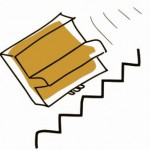Introducing PA Shorts: Lesson Interruptus
 I am inaugurating a new series of short posts and updates on a variety of topics that I have dubbed PA Shorts. Today’s PA Short concerns appropriate correcting of students. Enjoy!
I am inaugurating a new series of short posts and updates on a variety of topics that I have dubbed PA Shorts. Today’s PA Short concerns appropriate correcting of students. Enjoy!
This week I read two great posts on correcting student errors- one from Fran of the Cross-Eyed Pianist and the other from Geraldine in a Bottle. They spurred me on some to some self examination because, while in a perfect world, I would never interrupt my students, I am forced to do so more often than I am comfortable. So, I got to thinking about why.
During a half hour lesson, there simply isn’t time to play through a longer piece and then work on it in detail. The way I generally solve this is to work through sections only in earlier lessons- essentially dividing one longer piece into smaller ones. This works well with a student who is diligent- not so well with those that aren’t. The less diligent student will only practice the section for the week and thereby lose all the valuable work done on previous sections.
Gradually, we put the piece back together into larger sections. Often I take notes and give them to the student to save time. Once it is whole, I will hear either all or a specific section during the lesson. The weak link here is students who have trouble applying a correction to other places within a piece. I often have students use a colored pencil to mark all similar spots before they leave me (sometimes at a table during my next lesson).
I do my best not to interrupt but in cases of total piece meltdown, persistent inaccuracies, less than 10 minutes left, or other musical crisis, I must intervene. Mostly I wait until the end of a main section and say something like, “let’s stop there for today so we can work in detail.” Actually, I think that when I interrupt it is so shocking to the student that a strong point is made. I try not to abuse the privilege though. I’ve found an extra lesson or two is the only true solution to lesson interruptus.



As a student, I find it particularly difficult to be stopped every line or two. I think it would be very helpful to know ahead of time if there is a plan to stop frequently. It’s disconcerting. It is also disappointing to work really hard on a piece, learn 2 pages, and get stopped so many times that you only get through a few lines and your instructor doesn’t even know that you learned that second page.
Geraldine, I agree about helping each piecce improve over the long haul. Ultimately, the teacher needs to explain and help solve problems in such a way that the student can recognize similar problems in future pieces and solve them themselves. “Now, see how your hand is up here and you’ve put your elbow out to help stop rolling that chord? Remember back when you were doing This Other Piece, and the same thing helped you?”
Now, the student hasn’t just learned how to play This Piece and That Other Piece well, but has learned a diagnostic tool to help them notice and solve the same problem in future pieces.
I agree! Balancing the immediate need (mandatory area recitals, evaluations, etc) with allowing the student to discover a personal way of learning, working, playing, interpreting, and so forth is a never ending job.
I think minor corrections go beyond the obvious wrong notes and rhythms. Many teachers insist on a particular phrasing, on a specific way to take a breath, on a particular body movement, on a particular hand position, and more.
Many teachers are great musicians, and want what is best for the piece, and forget about what’s best for the student.
A student might never play a piece at the highest musical and technical level, but the reason the student is playing the piece is to make the piece perfect. The reason the student is playing the piece is to make it a stepping stone so that each piece improves in the long haul.
When a teacher makes too many detailed corrections, it helps that piece get better, but it doesn’t help the student understand how to get to make those details happen on his own.
Like the old joke: Dr it hurts when I do that. So don’t do that:) We music teachers also diagnose don’t we? I have also encountered quite a few students at a variety of levels who regularly don’t have a clue they are playing incorrect notes or rhythms. Some have learning difficulties but not all. If anyone has a teacher who regularly tells them about wrong notes or fingerings, or ??? with nothing to offer in the way of a why, they should run away and find a new teacher. That is of course if the student is really working, following whatever instructions are given, and prepared for their lessons.
Two things — I think there has to be a time to play a piece all the way through and get to fine come hell or high water AND a time to woodshed the picky bits. What’s needed is for teacher and student to agree which they are doing at the moment. If it’s barrel-through-to-the-end, then the teacher has to shut up and let the student recover from the mistakes. If not, then stop and get picky, or just comb through a particular tangle.
Also, the comments that were raised in those posts weren’t really “corrections,” they were more “statements of the obvious.” Saying, “You’re flat!” is like bringing a car into the mechanic, and when they ask you, “What’s wrong?” replying with, “It’s broke.”
So I boned a trill. I can tell that much, and I’m not making your money. Anything else to contribute? There was a Wednesday last week, too. 🙂
That’s when “find the source of the error” comes in, and where the teacher demonstrates their usefulness. I don’t need to know IF I’m hitting a wrong note. I can tell that much usually. I need to know WHY I may be doing it repeatedly, and HOW to fix the problem. It’s strategy and problem-solving a teacher provides, not statements of the obvious.
I agree communication is key. I also try not to use playing through the piece no matter what as punishment. There are times when it is a mercy to stop the student. It isn’t always because of poor preparation either:)
Great post! I think the definition of “not interrupting” doesn’t have to mean stopping an entire piece, but rather stopping at a spot not agreed upon with the student beforehand.
Like you, I also do a lot of section work, and I think that as long as we tell the student beforehand where we’ll stop, then the student confidence won’t be undermined.
I also think that once we’ve worked through a section or a piece, it’s best to work on details as they come, as long as we mention that plan to our student before we do it.
In other words, let’s keep on communicating with our students about what they can expect during their lesson!
A nagging topic isn’t it? One trouble with taking notes is that then your attention to the student and the music is divided.
Great description of “why,” and an especially catchy title!